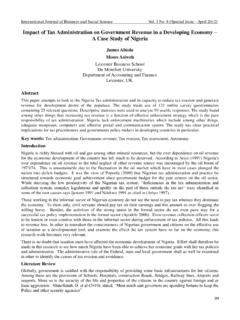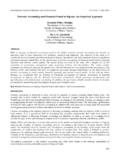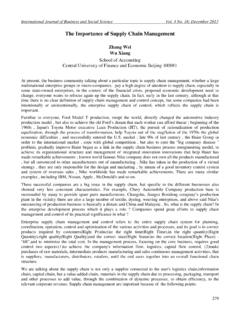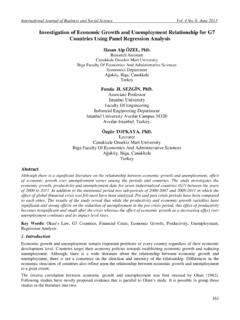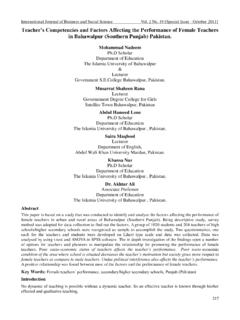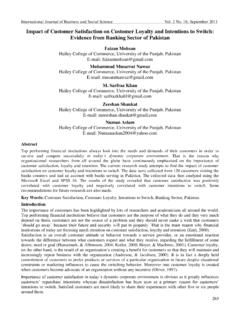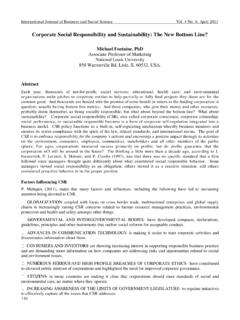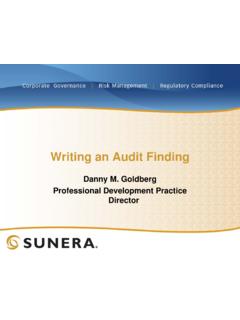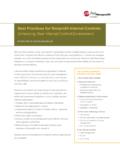Transcription of Internal Auditing Practices and Internal Control …
1 International Journal of Business and Social Science Vol. 4 No. 4; April 2013 165 Internal Auditing Practices and Internal Control System in Somali Remittance Firms Hussein Abdi Mohamud Assistant Lecturer Faculty of Business and Accountancy SIMAD University Mogadishu-Somalia Abstract This article investigated the relationship between Internal Auditing Practices and Internal Control system in Somali remittance firms. The demographic profile of the respondents was age, gender, qualification and experience. The main objectives are to identify the role of Internal Auditing , and to identify the level of Internal Control system. The study is based on 83 target population especially Accountants, finance director, chief cashier and chief executive officer in remittance firms Descriptive and correlation analysis was used.
2 It administers questionnaire as a research instrument. The findings of this article show that Internal Auditing Practices of remittance firms is effective but there is some limitation about separation of duties. The study also suggests that there is a positive correlation between Internal Auditing and Internal Control system. Keyword: Internal Auditing , Internal Control , Remittance firms, Somalia. 1. Introduction Internal Auditing became very important to world businesses, since industrial revolution resulted in factory systems that were financed by stockholders. This situation necessitated the need for Internal Auditing to protect shareholders best interest. The major factors assist in emergence of Internal Auditing was the extend span of Control system faced by management in businesses (institute of Internal Auditing research foundation, 2003).
3 Today, in businesses worldwide, the Internal Control functioning become very important for their operation and achieving the objective of organizations. The role of Internal Auditing is to assess the effectiveness of the Internal Control system and to find out whether the system is functioning as intended (Fadzil, Haron & Jantan, 2008). The demand of Internal audit unit in most African countries increased since its early inception 1930; however Internal audit Practices are not fully exercised (Giorgis, 2004). For example in Ethiopia Less attention is given to operational audits as well as the application of modern techniques such as flowcharting, statistical sampling, and computer Auditing . Internal auditors spend by ensuring that accounting records are properly maintained and reliable.
4 Furthermore the majority of Internal audit departments do not have a written audit charter. Therefore, the objectives, authority, scope, and responsibilities of Internal Auditing are not spelled out in most organizations, and no measures exist to ensure that the Internal audit department is recognized as acting with the authority and support of senior management. In Somali remittance companies handles a lot of money and contributes the livelihood of hundreds of thousands of families and develop the private sectors in a country where there is no properly functioning government, therefore how an Internal auditor is expected to be high while the staff security has no guarantee. Somali remittance companies suffer loss of millions of dollar due to lack of good quality Control system in remittance companies and professional Internal auditors therefore most of Somali organizations do not have effective and independence auditors (Somali money transfer association, 2009).
5 The main objectives of this paper are to determine the role of Internal Auditing in the selected remittance companies and how it is effective and also to find out the level of Internal Control system effectiveness in the selected remittance companies. This study intends to explore the influence of Internal audit on the effectiveness of Internal Control system of the Somali remittance companies. Further, this study identified the relationship among of the scope of work of Internal audit and the quality of Internal Control system. Centre for Promoting Ideas, USA 166 2. Literature Review Internal Auditing is designed to add value and improve the organizations operations by assisting organizations achieve their goals through evaluating and improving the effectiveness of risk management, Control and governance (Carcello, Herman son& Raghunandan).
6 According to Ho and Hutchinson (2010) Internal audit can bring systematic rules and disciplined approach to appraise and monitor the effectiveness of Control system, risk management and governance process. Fadzil et al (2008) found that the role of Internal Auditing is the reviewing of effectiveness and efficiency of Internal Control system and to find out whether the system working as intended. Effective Internal Control system provides reasonable assurance that the organization s objectives and goals will be achieved. According to Jenny, Mazlina and Nava (2008) noted four benefits that the managers have gained from Internal Auditing assistance. Those benefits were providing managers with the base for judgment and action, helping managers by reporting weaknesses in Control and performance and recommending improvement of Internal Control .
7 The main role of Internal audit as: independent appraisal of Internal Control system, independent review of the efficient operation of the organization, proper safeguarding of asset and preventing and detecting fraud and errors (Ho & Hutchinson). Fadzil, Haron and Jantan (2008) SPPIA are criteria by which the operations of Internal auditors are evaluated and measured and intended to represent the Internal Auditing practice as it should be. And also it intended to serve the entire profession of Internal Auditing . It was developed in June in 1978, at the Internal auditors international conference in San Francisco. The SPPIA consist the following five Standards. 1. Independence of audit Independence is the freedom from the Control and direct influence of line management this definition is an important to the extent of audit work and enhances Internal audit s objectivity and integrity.
8 Internal auditors should be independent form the activity they are Auditing . Independence allows Internal auditors to perform the impartial and unbiased judgments to the proper conduct of audit and achieved through organizational status and objective (Simon, 1995). According to Diamond (2002) Under Standard 100 of Internal Auditing standards Independence is to make objective judgment and mental free form directly management responsibility for what he is being audited, he is free to choose any transaction for audit and is allowed access to all necessary information to come up with informal judgments (Standard 100). 2. Professional efficiency Standard of 200 of SPPIA professional efficiency assumes that the audit staff must have professional knowledge and skills and has professional care and appropriate technical competence as well as sufficient knowledge of Internal Auditing function (Diamond, 2002).
9 3. Scope of work By 1993 the statement of responsibility of Internal audit issued at institute of Internal auditor noted that the scope of Internal Auditing is to investigate and assess of the adequacy and effectiveness of the organization s system of Control and the quality of performance in carrying out assigned responsibility. Internal auditor should review the accuracy and reliability of financial statement and the means of identify, measure, classify and reporting, review the system designed to ensure the compliance of policies, procedures and should determine whether company is compliance with those rules, review whether the company s assets are used appropriately and ensure that the assets are safe and verify the existence of such assets, evaluate the efficiency and effective way which resources are used.
10 Review operations to find out whether results are conformity with the established objectives and goals and whether the operations are being functioning as intended (Institute of Internal Auditing research foundation, 2003). 4. Performance of audit work Performance standard states the nature of Internal audit service and provide quality criteria intended to measure audit service. The Internal Auditing focus on specific organization performing certain Control function, procedures, rules and regulations set up to ensure the most economic efficiency and effective use of resource (Diamond, 2002). International Journal of Business and Social Science Vol.
